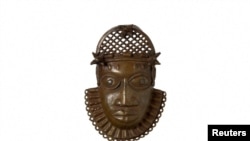The 72 artifacts that the Horniman museum agreed to return include 12 of the famous Benin Bronzes - symbolic of the ancient Benin Kingdom in southern Nigeria.
The museum said in a statement Sunday it was moral and appropriate to return the artifacts, stating the objects were taken by force during the British military invasion of Nigeria in 1897.
Nigerian authorities have praised the gesture. The National Commission for Museums and Monuments said it is a breakthrough after a meeting with the museum authorities in March this year, and they say they're looking forward to loan agreements and collaborations with the museum.
Babatunde Adebiyi is a legal director at the museum commission.
"We're simply very happy for Horniman museums and gardens to have kept their word. They have made a just determination of the issue by returning these antiquities. Some of these antiquities might be loaned to [the] Horniman museum for a period."
For years Nigeria has been negotiating the return of thousands of looted artefacts to their cultural bases in the southern party of Nigeria.
The antiquities were mostly taken from the palace of the Benin Kingdom during the colonial era.
As more are returned, authorities aim to set up a museum in Benin to store them, says Adebiyi.
"We're proposing and working hard toward having a royal museum in Benin city near the oba's [king's] palace. All these things are meant to house these antiquities. Apart from that, museums like the Lagos museum can provide adequate facilities."
Nigeria center for Liberty's Ariyo Dare Atoye welcomes the development.
"It's a good development for arts and culture in our nation, in Africa. It's a welcome idea that they decided to do this. A lot of people believe this ought to have been done decades ago, It is better late than never. It's an opportunity to boost our culture and tourism sector."
Abuja resident, Abdullahi Okugiya also welcomes the move.
"It will add value to our museum. Most of us read (about) it in the books, but we have not actually touched them or seen them."
In July, German authorities signed an agreement with Nigeria and began the process to return up to 1,100 Benin Bronzes to Nigeria, the most by a European country.
However, Atoye raises concerns about Nigeria's readiness and expertise to properly manage and preserve these artifacts.
He also calls for monetary compensation, as well.
"What have we benefited from the ones that we have recovered? Ordinarily,,the return of these artifacts ought to have come with [an] apology, number two, with reparation. Money has been made through these artifacts in some of these countries like the UK. If we're unable to make good use of the ones we've recoverd,,even Nigerians will be disinterested in the recovery of the ones leftover in the UK or any part of the world.
Nigeria has more than 50 national museums and authorities are looking to set up more.
Authorities and citizens are hoping the returns trigger more museums around the world to do the same, especially the British museum in London, which holds by far the largest and most significant collection of Nigerian cultural artifacts.
Nigerians Praise London Museum's Decision to Return Precious Artifacts




